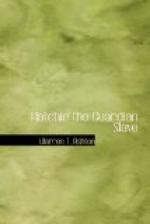Mr. Faxon reasoned in this manner. He could not believe, even with all the evidence before him. There was a reasonable answer, apparently, to every objection he could think of, and he resolved to apply to Jaspar and Hatchie for more information. All that Jaspar could say, or would say, in answer to his interrogatories, was that his brother’s wife had died in giving birth to a dead child; and that Emily, who was the child of a house-servant by him, had so engaged his attention by her singular beauty that he had substituted her for his own child. This story, Jaspar said, his brother had told him in the strictest confidence, many years before. Mr. Faxon, appreciating the disappointment of a father with such a sensitive nature as Colonel Dumont, was willing to believe that Emily had been substituted to supply in his affections the place of the lost child; but that he should educate her as his own child, and then cast her out from the pale of society, was incredible!
The evidence was so strong, he could see no escape from the terrible conclusion that the gentle being, to whom he had ministered in joy and in sorrow, was a slave! It required a hard struggle in his mind before he could reconcile himself to the revolting truth. Her beautiful character, built up mostly under his own supervision, he regarded with peculiar pride. He was not so bigoted, however, as to believe his labors lost, or even less worthy, because bestowed, as it now appeared, upon a slave. In heaven his labors would be just as apparent in the quadroon as in the noble-born lady.




